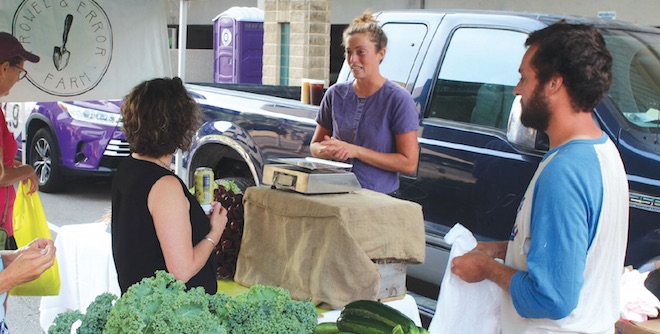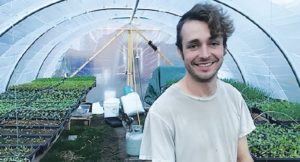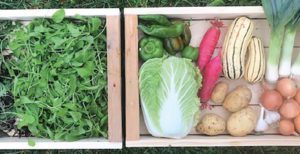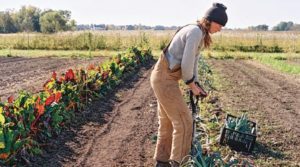

Nov 9, 2021City operation balances social distancing, customer access
A two-acre farm is small, but put it in a city and the story changes.
Combine that with the right partnering and the lessons learned from the COVID-19 pandemic in 2020, and the Trowel & Error Farm in Cedar Rapids, Iowa, is still in the business of growing vegetables. The name – Trowel & Error – reflects how many of those changes came about.
“We were really nervous at the start of the pandemic,” said Carly McAndrews, the farm owner and operator, with Bryant Mann. “We were afraid with the closure of the farm markets, we wouldn’t be able to sell our transplants.”
Enter a local nonprofit called Field to Family and a collaboration with the Iowa City Farmers Market. The result was an online farmers’ market. All of the sales were pre-ordered and customers had multiple pick up locations.
“When the online market started, all of our transplants were sold there,” McAndrews said. “With no in-person marketing in 2020, having that market was really helpful for us.”


Trowel & Error Farm also developed a drive-through pick up in 2020 for its CSA (community-supported agriculture) customers.
Field to Family continued its online farmers’ market in 2021, but Trowel & Error Farm opted for direct sales of transplants from its greenhouse in Cedar Rapids. It was an outdoor, in-person, socially distanced plant sale, and customers were asked to bring a mask. The Iowa City Farmers Market went back to normal operations.
Trowel & Error Farm’s two acres of vegetable production is about 25 miles from Cedar Rapids in Iowa City, Iowa. This is where the CSA share pick-ups were resumed in 2021.
“We went back to people loading the produce themselves,” McAndrews said. “People don’t come all at the same time and the pick-ups were all outdoors, so there was social distancing.”
Trowel & Error Farm also sells at the Uptown Marion Farmers’ Market in Marion, Iowa and the Cedar Rapids Downtown Farmers’ Market in Cedar Rapids.
An innovative CSA is part of the story, but a CSA means growing a wide assortment of vegetables. For Trowel & Error Farm, that’s more than 40 kinds. The list includes favorites like onions, carrots and tomatoes, to more unique vegetables like arugula, kohlrabi and Swiss chard.
“It’s common for CSA farms to grow a ton of different choices,” McAndrews said. A full share at the CSA features eight to 10 different vegetables each week. “You need a wide variety; you need to give people a wide choice. We don’t specialize. We grow a wide diversity of vegetables, and there’s risk management with diversity, too.”
The CSA offers weekly full and half shares. Trowel & Error Farm recently added a fall CSA to complement its summer CSA.
The summer CSA is 16 weeks, begins in June and runs through the third week of September. The fall CSA runs for four weeks, until the end of October.
“We like breaking up the season,” McAndrews said. “People may really like root crops and greens and get really excited about a fall CSA. It gives people more choices.”


The CSA membership agreement is important.
“It’s an opportunity to get everyone on the same page,” McAndrews said. “When you say CSA, one person may think one thing, and another person thinks something else.”
The agreement covers the basics like the share prices and when and where to pick up. It clarifies what happens when the unexpected occurs, such as when heavy rains damage the crops. The document provides a framework for addressing any issue that occurs down the road.
The CSA also recently started having working members. Two CSA members signed up in 2020 and four in 2021. Three hours of work per week on the farm gets the members their share free, but that isn’t the only reason why they sign up.
“It’s a good way to get fresh produce, but it’s also a good way to learn about organic farming,” McAndrews said. “It has been quite a popular program. For us, it’s another way to get our produce out to people.”
See more on farmers’ markets››
The transplants and early-season vegetables are grown in a caterpillar tunnel at the farm’s Cedar Rapids location – a city of nearly 150,000 people. Iowa City – the site of the two acres of vegetable production – has a population of nearly 80,000.
“It’s really awesome being in the city,” McAndrews said. “The CSA drop off is right at the Iowa City farm. It doesn’t feel isolating at all, like it might if it was out in a more rural area.”


The farm isn’t certified organic, but uses organic practices. A good rotation is part of that. The two-acre farm is divided into six blocks. Two blocks are brassicas, one block is solanaceous vegetables like tomatoes and peppers, one is alliums like onions, one is cucurbits, and one block is for root crops and greens. Vegetables in the same family are grouped, and the groups rotated to prevent a build-up of pests.
Most blocks are on a six-year rotation, but there are so many brassicas they have to be on a three-year rotation. Cover crops are grown on any land that’s not in production. Compost is used and organic certification is the ultimate goal.
“We only use products that are certified for use on organic farms,” McAndrews said. “We’re committed to soil health.”
A local Land Access Program offered by Johnson County, Iowa, rents the two acres to Trowel & Error Farm. The program is intended to give local farmers an entry point into the urban market. As a first-generation farmer, this support was important for McAndrews to start Trowel & Error Farm.
“I worked on a few different vegetable farms, mostly in the Northeast, before moving to Iowa, where I studied sustainable agriculture at Iowa State University,” McAndrews said. “We started the farm at the same time as the Land Access Program started. We were very fortunate.”
The eventual goal is to one day live where they farm.
“That would make it a lot easier for us, and eventually maybe we could add a few chickens and sheep,” McAndrews said.
The farm name of Trowel & Error Farm came about quite spontaneously.
“I just thought of it one day,” McAndrews said. “I was going to the field with tomatoes and had a trowel in my hand and just thought of it. It’s so what farming is. It’s a good name for a vegetable farm.”
— Dean Peterson, VGN correspondent














